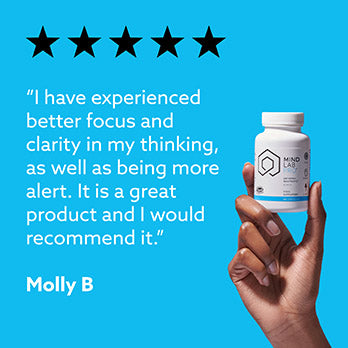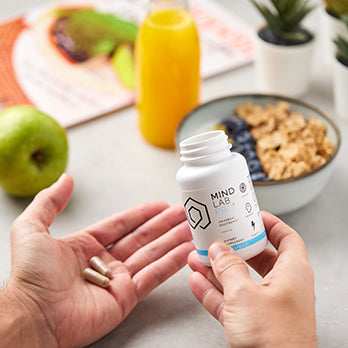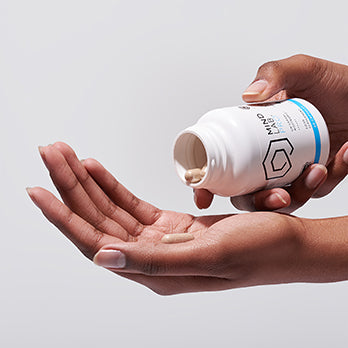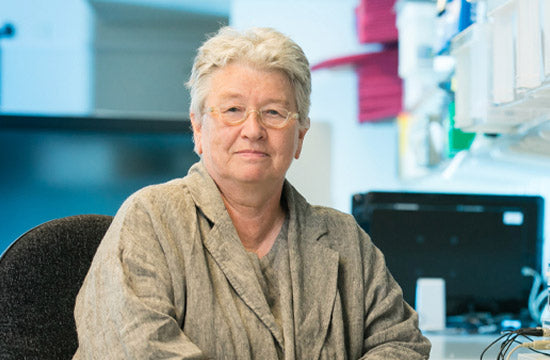Motivation is the key that unlocks peak life performance.
So why do so many of us seem to struggle with our inner drive from time to time?
The answer may lie in brain chemicals -- especially dopamine.
Nootropics for motivation support healthy dopamine levels to promote better drive.
This guide discusses how these nootropics, when combined in a smart stack, may boost motivation to new heights and unleash superior life performance.
Nootropic-Motivation Connection
You may have the ability but it's your motivation that makes it count.
Many say that motivation only comes from within. And if your inner motivation is a match simply waiting to be lit, here's your inspirational ignition:
- The best nootropic supplements right now may not only increase motivation but also enhance the cognitive and biological structures underlying your motivational output for long-term productivity.
The key target of nootropic intervention: the neurotransmitter dopamine.
If you wake up in the morning feeling like the spice of life is gone, odds are it is. The "spice" your missing is dopamine, the primary catecholamine chemical that fuels our ambition -- hence its nickname "motivation molecule."
However, with over 110,000 research papers written on the brain chemical within the past 60 years, the full functionality of the neurotransmitter remains a source of controversy among the neuroscientist community.
So, with that in mind, let's review the relationship between dopamine and motivation before discussing which nootropics best enhance this connection.
Dopamine Pathway to Motivation
Dopamine is the key neurotransmitter involved in both the good and bad aspects of the "Reward Pathway" of motivation.
Dopamine essentially is motivation. It's the neurochemical synonym for drive, and a powerful tool used by the brain to reinforce repeat behavior.
This form of dopaminergic manipulation is often referred to as the Reward Pathway, or the pleasure pathway, due to the pleasurable outcome of dopamine release, which occurs under a variety of circumstances:
- Solving a problem or learning something new
- Entering or engaging new ideas, territories, etc.
- Eating or drinking something tasty
- Smoking cigarettes or doing drugs
This variety illustrates the good and bad aspects of the Reward Pathway.
Related Post: Nootropics for Euphoria
Simply put, more positive behaviors (e.g., learning new information, engaging new ideas, etc.) are more likely to occur when the brain's Reward Pathway is well-stocked with dopamine and dopamine receptors.
Whereas dopamine deficiency (and/or dopamine receptor deficiency) increases the likelihood of seeking easy, unhealthy "fixes" of dopamine release (e.g., junk food, drugs, etc.).<1>
The symptoms of dopamine deficiency include:
- Apathy, or Lack of Motivation
- Procrastination
- Anhedonia, or Lack of Pleasure
- Low Energy
- Addictive Behavior
- Depression and Mood Imbalance
- Poor Memory and Learning Performance
While dopamine isn't the only biochemical factor involved in motivation and drive, it's a central figure in the equation. Thus, supplementing with dopamine-boosting and energy-promoting nootropics may go a long way in restoring and enhancing motivation levels.
Mind Lab Pro® Nootropics for Motivation
The smartest nootropics for motivation do one (or more) of three things:
- enhance dopaminergic biopathways
- improve brain energy
- reduce the negative effects of stress and over-activity.
What's more: nootropics are safe. As opposed to drugs and synthetics that enhance motivation and energy through a synthetic flush of dopamine activity, natural nootropics optimize natural dopaminergic and metabolic pathways -- thus increasing resistance to addiction and long-term side effects.
Traditionally, it's the easy "fixes" of dopamine that demolish our long-term drive. Nootropics buck this trend by boosting the biological structures of motivation themselves. The list of motivational nootropics include:
N-Acetyl L-Tyrosine
The active form of L-tyrosine (N-Acetyl-L-Tyrosine) replenishes neurotransmitters, including dopamine for motivation.
Even the most motivated people who love their jobs and daily routines, who wake up sprinting to start the day's work, struggle to stay motivated and enthused by mid-afternoon Thursday -- especially if they've been operating at 110% since Monday.
The brain simply cannot sustain high levels of mental activity over long periods of time. One reason for this: tyrosine burnout.
A highly active, stressed brain burns through excitatory catecholamines like there's no tomorrow. This feel-good rush of mental energy and productivity may contribute to bursts of motivation, but when the body's natural tyrosine reserves are used up, so is your brain power.
Put simply: no L-tyrosine, no more motivation.
L-Tyrosine serves as a master precursor for several brain chemicals, including the dopamine that drives motivation.
 Biochemical pathways linking tyrosine, dopamine, and norepinephrine. (source)
Biochemical pathways linking tyrosine, dopamine, and norepinephrine. (source)For countering brain burnout, N-Acetyl-L-Tyrosine (NALT) is the preferred form of supplementary tyrosine. Although, it's important to note that NALT's brain benefits are most acutely noticeably during conditions of high stress and activity.
According to research, the bio-benefits of tyrosine supplementation during stressful conditions may work to improve:
- Working Memory - under competing requirements to perform multiple tasks, L-tyrosine has been found to maintain mental and memory performance.<2>
- Learning Speed - cognition impaired by severe cold exposure has shown improvements in information processing speed and accuracy with L-tyrosine supplementation.<3>
- Sleep-Deprived Cognition - tyrosine supplementation has been associated with a significant reduction in the usual cognitive performance decline correlated with sleep deprivation, viz. "all-nighters."<4>
A healthy motivation spurned by healthy catecholamine levels requires a healthy number of L-tyrosine aminos. Highly demanding mental tasks, physical stressors, and poor sleep -- common attributes of a busy life -- threaten to throw the biochemical system of motivation out of balance.
- Supplementing N-Acetyl-L-Tyrosine may keep your motivational fuel reserves from reaching "Empty" before the end of the work day, work week, workout, etc.
More on Mind Lab Pro® N-Acetyl L-Tyrosine
L-Theanine
While most of L-theanine's benefits pertain to its ability to boost alpha brainwaves, this nootropic may also indirectly increase dopamine, serotonin, and GABA.
Both coffee and green tea contain caffeine, yet the former jazzes up energy while the latter relaxes cognition. How is that? The answer: L-theanine.
As one of the primary bioactive constituents of Camellia sinensis, the caffeinated herb used for various teas, L-theanine is responsible for the calm, relaxed boosts on cognition that come with a cup* of green tea. (*Or rather a "pot," indicating the need of an L-theanine supplement for its nootropic effects.)
However, what sets this anxiolytic amino apart from other relaxing compounds is that it achieves calm without the usual apathy or sedation.<5> Meaning that:
L-theanine promotes anxiolytic relaxation while sustaining -- often enhancing -- focus, attention, and motivation.
And it does this by promoting alpha brainwaves, the EEG-monitored brain frequencies associated with meditative "relaxed wakefulness."
Often stacked with caffeine, L-theanine is one of the most popular nootropics currently on the market for its complementary synergy with cognitive stimulants. The problem with straight stimulation is that the boost in energy may compromise the boost on cognition.<6>
Caffeine may energize your mood and motivation, but your thoughts become too jittery and inattentive to achieve genuine productivity. L-theanine ameliorates over-excited nerves but sustains the energy.
What's more, the amino also has suggested links with brain increases in dopamine, serotonin, and GABA levels, resulting in improved mood, memory, and learning performance.<7> The perfect nootropic for a reduced anxiety -- "Keep Calm and Carry On" -- workplace experience.
More on Mind Lab Pro® L-Theanine
B-Vitamins
B-Vitamins are semi-essential co-factors in catecholamine synthesis and thus reliable sources of mood and motivation enhancement.
Of the B-Vitamins, vitamin B6 is the most important for brain function -- yet, other B vitamins, such as B12 and folate, may help with neurotransmitter metabolism as well. The specific motivational neurotransmitter pathways facilitated by B6 include:
- Conversion of L-DOPA to Dopamine.
- Conversion of 5-HTP to Serotonin.
- Conversion of Tryptophan to Serotonin.
This is why B-Vitamins are often stacked with L-tyrosine: they enable the ultimate conversion of dietary L-tyrosine to catecholamines. And there are other key neurotransmitters affected by B vitamin levels: e.g., GABA, norepinephrine, and melatonin.
B-Vitamins regulate various neurotransmitter conversions, including for the Motivation Molecule, dopamine.
 B6-dependent neurotransmitter syntheses: (A) Serotonin from L-tryptophan, (B) Dopamine from L-tyrosine via DOPA and (C) GABA formed from L-glutamate. By Hellmann H, Mooney S <CC BY-SA 3.0>, via Wikimedia Commons
B6-dependent neurotransmitter syntheses: (A) Serotonin from L-tryptophan, (B) Dopamine from L-tyrosine via DOPA and (C) GABA formed from L-glutamate. By Hellmann H, Mooney S <CC BY-SA 3.0>, via Wikimedia Commons
As we age, B vitamin status gradually decreases, leading to a correlative decrease in cognitive ability, focus, brain energy, mood and motivation. With that in mind, B vitamin intake bears a significant association with cognitive status, particularly among older men and women:
- Study 1 - Among elderly Koreans, B vitamin intake was found to significantly impact cognitive function, demonstrating a higher rate of improvement among the cognitively impaired subjects as compared to the normal subjects.<8>
- Study 2 - In a review on vitamin B12, the supplementation of B12 and folate was found to slow the rate of neurodegeneration among subjects with mild cognitive impairment.<9>
However, you don't have to wait to enjoy the brain benefits of B vitamins. The brain is always in need of B vitamins for neurotransmitter synthesis, and supplementing a quality B vitamin stack is a great move to keep the brain nourished for exceptional mood, motivation, and mental performance.
More on Mind Lab Pro® Vitamin B6
More on Mind Lab Pro® Vitamin B9
More on Mind Lab Pro® Vitamin B12
Learn more about the 2017 Mind Lab Pro® formula upgrade that added these B-Vitamins in premium NutriGenesis® form here.
Rhodiola Rosea
One of Russia's best kept secrets, Rhodiola Rosea helps regulate stress responses, thereby improving better mental motivation, performance and clarity.
Kept secret from the Western parts of the Iron Curtain throughout the Cold War, Rhodiola rosea is a powerful adaptogen grown in the high altitudes of Siberia. And the reason for its secrecy lies in its demonstrated abilities to turn humans into superhumans by reducing the negative effects of stress and fatigue.
If L-tyrosine mitigates brain burnout by ameliorating the negative neurotransmitter effects of high stress and brain activity, then Rhodiola ameliorates stress from the opposite end of the spectrum: by regulating stress hormone cortisol activity.
In terms of mental performance, a few studies have observed Rhodiola's mental performance benefits, which include:
- Fatigue Reduction - As compared to placebo, a single dose of Rhodiola improved mental performance under military conditions of mental fatigue.<10>
- Stress Resistance - Tested on night shift physicians, who showed improvements in processing, focus, short term memory, concentration, and math.<11>
- Mind-Body Performance - During stressful exam periods, foreign students improved their mental performance as well as their neuro-motor functionality.<12>
Rhodiola rosea is one of those nootropic herbs that you can feel working in minutes, particularly in the late afternoon as mind and motivation begin to wane.
Taken as a late shift boost or a pre-workout, Rhodiola can accomplish major motivational improvements as soon as you need them.
More on Mind Lab Pro® Rhodiola Rosea
Conclusion
Mind Lab Pro® supplies the best dopamine nootropics for motivation in a superior-quality brain-boosting formula.
Better still, Mind Lab Pro® is the world’s first Universal Nootropic™ -- boosting multiple brain pathways to promote 100% Brainpower™.
When the mind is highly motivated and the brain is firing on all cylinders thanks to Mind Lab Pro®, a state of exhilarating peak performance follows -- helping you to excel at work, academics, athletics and life itself.
Related Post: Does Citicoline Increase Dopamine?
References
- Barron AB et al. The roles of dopamine and related compounds in reward-seeking behavior across animal phyla. Front Behav Neurosci. 12 Oct 2010; 4: 163.
- Thomas JR et al. Tyrosine improves working memory in a multitasking environment. Pharmacol Biochem Behav. 1999 Nov; 64(3): 495-500.
- Mahoney CR et al. Tyrosine supplementation mitigates working memory decrements during cold exposure. Physiol Behav. 2007 Nov 23; 92(4): 575-82.
- Neri DF et al. The effects of tyrosine on cognitive performance during extended wakefulness. Aviat Space Environ Med. 1995 Apr; 66(4): 313-9.
- Nobre AC et al. L-theanine, a natural constituent in tea, and its effect on mental state. Asia Pac J Clin Nutr. 2008; 17(S1): 167-68.
- Haskell CF et al. The effects of L-theanine, caffeine and their combination on cognition and mood. Biol Psychol. 2008 Feb; 77(2): 113-22.
- Nathan PJ et al. The Neuropharmacology of L-Theanine (N-Ethyl-L-Glutamine): A Possible Neuroprotective and Cognitive Enhancing Agent. Journal of Herbal Pharmacotherapy. 2009 Aug 20; 6(2).
- Kim H et al. Associations between intake of B vitamins and cognitive function in elderly Koreans with cognitive impairments. Nutr J. 2014; 13: 118.
- Health Quality Ontario. Vitamin B12 and Cognitive Function. Ont Health Technol Assess Ser. 2013; 13(23): 1-45.
- Shevtsov VA et al. A randomized trial of two different doses of a SHR-5 Rhodiola rosea extract versus placebo and control of capacity for mental work. Phytomedicine. 2003 Mar; 10(2-3): 95-105.
- Darbinyan V et al. Rhodiola rosea in stress induced fatigue--a double blind cross-over study of a standardized extract SHR-5 with a repeated low-dose regimen on the mental performance of healthy physicians during night duty. Phytomedicine. 2000 Oct; 7(5): 365-71.
- Spasov AA et al. A double-blind, placebo-controlled pilot study of the stimulating and adaptogenic effect of Rhodiola rosea SHR-5 extract on the fatigue of students caused by stress during and examination period with a repeated low-dose regimen. Phytomedicine. 2000 Apr; 7(2): 85-9.




































